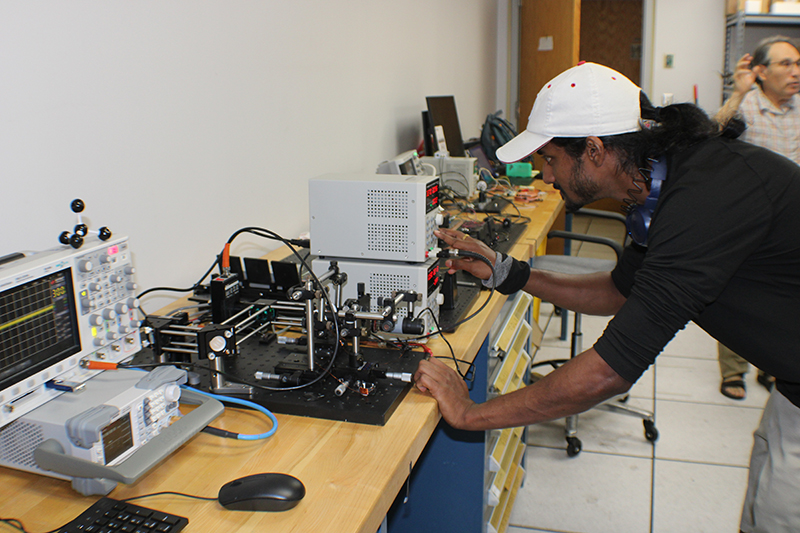News Story
New Quantum Hardware Lab Made Possible by Donation from ECE Alum Paul Gaske ‘76

Graduate Teaching Assistant Gavishta Liyanage adjusts a NV Diamond Magnometer
A quantum hardware lab in the A.V. Williams Building is scheduled to open in the fall of 2025. In conjunction with the new minor in Quantum Science and Engineering (QSE), the lab will provide students with hands-on experience in quantum computing, quantum communications and quantum sensors.
Designed by Professor Julius Goldhar and Bryan Quinn ‘01, ECE Director of Technical Operations, the lab will provide space for up to 12 students at once and will feature workstations with state-of-the-art equipment for use in quantum experiments, as well as custom-made concrete flooring which will provide a stable surface for sensitive quantum equipment.
Construction of the lab has been supported by a generous gift from ECE alum Paul Gaske ’76 and his wife Ellen Gaske ’75 through the Paul and Ellen Gaske Foundation. The lab will be named in their honor as the Gaske Quantum Science and Engineering Teaching Lab. In addition, the foundation is also supporting the creation of the Paul and Ellen Gaske Quantum Technology Teaching Lab, which will be located in Stanley R. Zupnik Hall, which is scheduled for substantial completion in Fall 2026. Paul stated the motivation for this gift was “quantum technology and science is advancing rapidly and will have an enormous impact on society. Receiving exposure to quantum applications in an engineering setting will be a valuable experience for students as they seek to solve the engineering problems of the future.”
Paul Gaske earned his bachelor’s degree in electrical engineering from UMD and a master’s degree in computer science from Johns Hopkins University. He began working at Hughes Network Systems in 1977 and is currently chief operating officer of Echostar Corporation, which acquired Hughes in 2023. He is a past chair and current member of the A. James Clark School of Engineering Board of Visitors.
Ellen Gaske earned a bachelor’s degree in special education and general education from UMD in 1975, and a master’s degree in communicative disorders and a Ph.D. in special education and learning disabilities from Johns Hopkins University. She is a member of the UMD College of Education Board of Visitors and the University of Maryland College Park Foundation Board of Trustees. She recently retired as the senior vice president of academics at Specialized Education Services, a national company that serves students with learning disabilities.
The Gaske’s are also supporters of the University of Maryland College of Education, including recently pledged funding for the renovation and expansion of the College of Education’s Benjamin Building and the creation of a TerpsEXCEED fund to provide college experience for Maryland students with intellectual disabilities.
The Gaske Quantum Science and Engineering Teaching Lab will be equipped with six experimental modules that will demonstrate devices and experimental techniques relevant to quantum computing, quantum communications, and quantum sensors. One module, a Nitrogen-Vacancy (NV) diamond magnetometer was developed by the Walsworth Research Group, led by Professor Ron Walsworth, Director of the UMD Quantum Technology Center.
The NV Diamond Magnetometer uses lasers to excite the NV centers in a diamond, which are then introduced to microwave radiation. The resulting spectrum can be used to determine magnetic fields in minerals and applied to the development of quantum sensors.
Another module, Quantum Key Distribution, will exhibit the fundamentals of quantum communication by sending the information via quantum channels and classical channels. According to the laws of quantum mechanics, if an eavesdropper intercepts any useful information, then it’s presence will be detected. This allows for generation of completely secure one-time-pads, which can be used for secure encoding.
The debut of the Gaske Quantum Science and Engineering Teaching Lab is in alignment with the ECE Department’s mission of providing an exemplary interdisciplinary program that will educate the next generation of quantum scientists and engineers.
Published August 27, 2025









